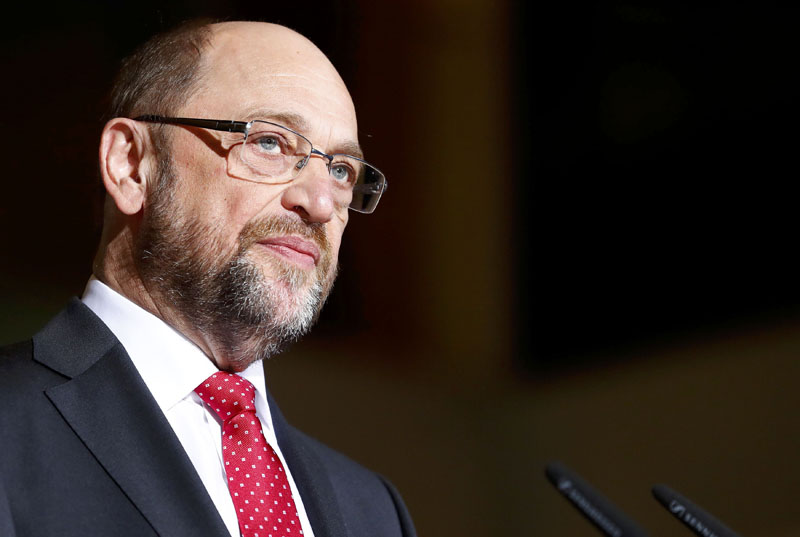German SPD chief Gabriel makes way for Schulz to run against Merkel
BERLIN: Germany's centre-left Social Democrats (SPD) nominated former European Parliament president Martin Schulz on Tuesday as their candidate to run against Angela Merkel for the post of chancellor in September's national election.
The nomination followed party leader Sigmar Gabriel's decision to stand aside for Schulz, a move that shows the SPD is serious about ending its role as a junior partner in Merkel's current right-left coalition after the September 24 vote.
Opinion polls suggest Schulz, 61, has a better chance than Gabriel - though still very small - of unseating the conservative Merkel, who has led Germany since 2005 and is Europe's most powerful leader. Her grand coalition with the SPD has governed Germany since 2013.
Asked during a news conference at the SPD headquarters in Berlin to explain his decision to make way for Schulz, Gabriel said: "Because he has a better chance".
Schulz has taken a tough stance against right-wing populism across Europe and will fight for social justice and democracy, Gabriel added.
The party is expected to confirm Schulz's candidacy as well as his leadership of the party at a meeting on Sunday.
However, Schulz faces an extremely tough job to oust Merkel, whose conservatives lead the SPD in opinion polls by up to 15 percentage points.
"This country needs a new leadership in these difficult times," Schulz said, warning that European societies were being torn apart by populism.
Earlier, Gabriel made a rare attack on Merkel and her insistence on financial austerity during the euro zone crisis.
"The policies of Angela Merkel and (Finance Minister) Wolfgang Schaeuble have no doubt contributed to the deep crises in the EU since 2008, to the isolation of a dominant German government and through a relentless insistence on austerity, to high unemployment outside Germany," he said in a statement.
This has boosted anti-European populist parties, he added.
"CLEAR SIGNAL"
The SPD wants to form a coalition with smaller parties on the left but most analysts still think another right-left coalition is the most likely outcome of September's election.
Senior SPD lawmaker Karl Lauterbach told broadcaster WDR: "This is a clear signal - no grand coalition. With Martin Schulz we have a better chance."
A poll conducted this month by the Emnid institute for the Bild newspaper showed that in a direct vote Schulz would win 38 percent versus 39 percent for Merkel, compared to a result of 27 percent for Gabriel and 46 percent for Merkel.
Schulz is a committed European. In 2003, Italy's then-prime minister Silvio Berlusconi caused a storm for jokingly offering Schulz a film part as a concentration camp guard.
As a young man, Schulz had to ditch his aspirations to be a footballer and later became a book seller. He announced in November he would return to German politics after his stint as president of the European Parliament.
However, his pro-European stance makes him vulnerable to attacks from the anti-immigrant and anti-euro Alternative for Germany (AfD)) which has made big gains in the last two years, especially due to the migrant crisis.
"Symbol of EU bureaucracy and a deeply divided Europe as chancellor candidate?" tweeted AfD co-leader Frauke Petry.
Gabriel said he would shortly become German foreign minister, replacing Frank-Walter Steinmeier, who will become the country's president, a largely ceremonial post.






